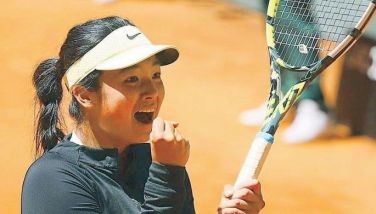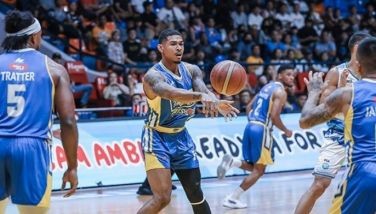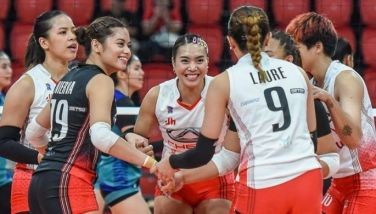Gilas rolls past Mongolia for seventh place
INCHEON, South Korea – Gilas Pilipinas made its farewell appearance in the 17th Asian Games last night, stopped halfway in its final climb to the pinnacle and finishing seventh in the sport it vowed to rule this year.
The Philippine team decided that placing last was the biggest humiliation and made some effort to score an 84-68 triumph over Mongolia in their consolation round playoff at the close of the classification rounds yesterday at the Hwasheong Sports Complex.
With its unexpected seventh place finish, the Gilas Pilipinas coach and his players, tired, burnt out and spent at the end of a long journey that started in the 2010 Guangzhou Asian Games, have been the subject of ire and criticism. The sports media covering the 17th Asian Games are also on the firing end for failing to make a verbal blast.
There were many controversial sides to the “great debacle” but so far there are no winners.
The story of Gilas Pilipinas in the 17th Asian Games is not really why and how it was lost but how it could have been won, because, after the World Cup, it loomed as the team to beat. There are so many ifs — from the point of view of the coach, the players, the SBP and the viewing fans.
The first IF: We should have won over Qatar in the first game of the quarterfinal because a team needs two wins to advance to the semifinal. If only we won over Qatar…
“The story of this tournament is the story of the Qatar game,” explained national coach Chot Reyes after their 65-67 loss to the Mideast nation.
If Marcus Douthit played as well as Andray Blatche, we could have won. But Douthit wasn’t Blatche.
In that game, Douthit’s commitment to the team was suspect, the way Reyes saw it, and was collectively blamed (by both coach and team) for the loss since the Philippines was winning till the last quarter. He could not deliver when they needed a go-to guy.
Or it could have been different if the ref did not nullify a shot by Douthit to the Kazakhstan basket in the last 14 seconds of the game. The shot could have tied the count in regulation at 67 and the Philippines could have gone into overtime to build the minimum 10-point lead to win via the tiebreak and advance to the semis.
Or, going back, the story could have been different if China and Korea did not block the participation of Blatche.
Gilas Pilipinas realized it needed more than just a legitimate center to give itself a chance and found in Blatche the versatility of a tall person who could shoot. The Gilas coaching staff “scouted” Blatche in the NBA and saw his credentials were sufficient for a legitimate center who could not only do rebounds but could also shoot, play the point, the shooting guard, and the forward position.
Despite the bureaucratic difficulty of getting him naturalized through an act of Congress and the President’s signature within short notice, SBP’s Manny V. Pangilinan and his executive staff were able to get the documents processed.
He performed according to expectations in each game – against world powers in the World Cup.
Korea, the host country which doesn’t want to lose on home turf, and China which never uses naturalized players as a matter of pride, objected to his participation because Blatche makes Gilas Pilipinas hard to beat. They used the three-year residency rule as an excuse.
In a press conference here before the Games, the national coach ended all discussions on Blatche and Douthit and even local players left back home, saying “I’m not concerned over the players that are not here, only on the players that are here.” He lived and died with the players selected for Incheon.
These were the big IFs. There were smaller ones, but these are the big ones.
Project Gilas, the most costly undertaking that took four years to build, went through a process of building and rebuilding entirely using private funds, mostly from the MVP Foundation, with players coming in and out in a four-year period before Reyes chose his final 12.
The choice of local players was not an easy process. Some ball clubs were hesitant to lend their players at first because it would reduce their winning chances in the PBA. Players quietly and politely declined to play for the national team because the national team would lose anyway and their commercial value would go down with injuries sustained in foreign competitions. Marc Caguioa sustained injuries that required treatment in the US, and Asi Taulava suffered injuries that sent him into retirement. About eight came from an international joust two years ago with banged bodies and never made it again to the national team.
The PBA had to get a consensus among ball clubs to secure their full commitment to the Gilas program. It would entail freeing players for a specified number of months to join Gilas practices and adjusting the PBA calendar even if it would result in lower gate receipts.
For his part, to get the best player combinations possible, MVP (for Manny V. Pangilinan) used “basketball diplomacy.” At one time, when his spokesperson said the SBP was considering using amateur players instead of PBA players, the SBP hierarchy immediately “fired” him and probably asked for an apology from the PBA. To get the best players asked by the national coach, Talk N Text used the player trade to get choice players for Talk N Text and send them to the national team. It was a big sacrifice.
In the end, the players chosen were fit enough for the World Cup where they played amazingly well. But they were tired afterwards.
They don’t have the vast experience to right seasoned teams reinforced by NBA players and too short and physically inferior to the oversized opposition. They were the smallest team in the World Cup.
With their skills ad fighting heart, they and Blatche were able to fight toe-to-toe with teams in the group stages. However, in every game they lacked the finishing kick.
Reyes said they lack the experience to finish the game the way they started it.
The same was true in the Asian Games. In all its matches, Gilas Pilipinas always led by 15 points until the last four minutes of play when the opposing team would overhaul the lead and win by a whisker.
Could Gilas Pilipinas have won the Asian Games with a better combination of players or a different coach? National teams in the past used different player and coaches selected through a democratic process and they all lost. Like the others before them, Gilas Pilipinas failed but they excited our imagination and gave us something to cheer about because they all had a big fighting heart.
And that’s all that matters.
- Latest
- Trending































